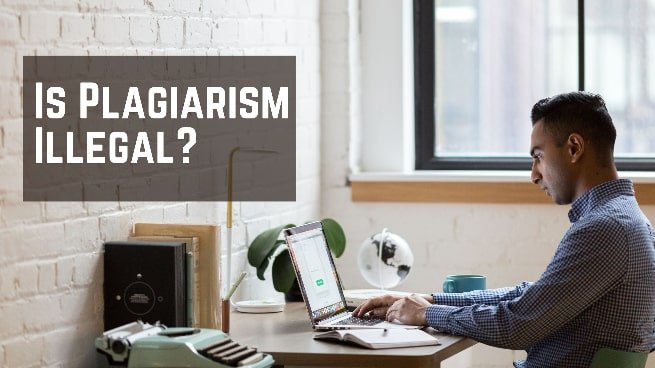Is plagiarism illegal? Ethics, Consequences, and Prevention

October 12, 2023
Essay writing is one of the most common assignments students get in college. As soon as they encounter it, a question appears: is plagiarism illegal? Before we answer it, let’s figure out plagiarism because this concept is much more nuanced than you probably imagine. Plagiarism is copying another author’s ideas or words with no rightful references. It can be deliberate or accidental — even if you don’t mean to steal content, you're committing plagiarism when presenting someone else’s idea without attributing it to the owner. It has harsh consequences, and the only way to escape them is by learning what kinds of plagiarism exist, what they can lead to, and how to avoid them.
Why Plagiarism Is Harmful from an Ethical Perspective
Plagiarism has the power to poison you in every way it can. Legal consequences aside, when you borrow content and don’t attribute it correctly, you are compromising your reputation as a student, future professional, and human being. The college expects you to maintain academic integrity: you’ve come here to learn and to improve your knowledge. By stealing other people’s work, you demonstrate disrespect and show yourself as dishonest.
If you’re caught committing plagiarism even once, your professors will never look at you the same. Even if you become a star student, they will always have this nagging doubt at the back of their mind: what if you’re still plagiarizing? What if they entrust an important task to you or recommend you to someone, and you display another bout of dishonesty? You should still consider your reputation if you don’t care about ethics. That’s why plagiarism is never a solution.
Real Academic Consequences as Told by Guilty Students
College students guilty of plagiarism face serious consequences that often become a nightmare. To give you an idea, let’s review them by their severity. Note that each college might have unique rules for dealing with plagiarizing students. We collected many stories and testimonies and will share them with you.
- Resubmission of an essay. The best punishment students who stole someone else's work can hope for is having to re-write their paper. Yes, it’ll take some of your time, but this is a second chance not every professor is willing to provide.
- A failing grade for an assignment. Sometimes, students are not allowed to re-submit their papers. They receive an F, and that’s it. It affects their final grade negatively, but ultimately, it’s still a bearable punishment.
- A failing grade for the entire course. Now, this is a more severe punishment for copyright infringement. Even if you used to be an A-student, one case of plagiarism can result in a failing grade for your entire course. This creates problems with your overall performance, and everything might end in a disaster where you cannot complete your academic year.
- Suspension. Being suspended always sucks because you’re missing out on education. It’s also accompanied by the overall sense of humiliation and the need to keep doing homework by yourself without knowing when you’ll be able to come back.
- Extra work and meeting with a committee. Sometimes, in addition to suspension, students who violate someone’s intellectual property must write a huge essay on a topic that a special integrity committee assigned to them. In most cases, it’s a 10K-word essay about the dangers of plagiarism. You’ll have to present it to them and repent verbally. Based on what students say, this is not a pleasant experience.
- Expulsion. If you need any other motivation to avoid plagiarism, this is one. Some students are expelled for good. You lose the money you paid for your education, the time you spent studying, and the hopes to graduate with others. Most colleges and universities don’t resort to it, but it’s still possible, and you need to be ready in advance.
Potential Legal Consequences of Plagiarism
Hopefully, you understand why resorting to plagiarism is a terrible idea. It causes serious consequences on a college level. But is it actually prison-sentence-worthy illegal? No. Students might lose a chance at earning their degree, while employees might be fired if caught plagiarizing, but this is it. They won’t be thrown in prison or anything like that.
Copyright infringement is a different matter. Copyright secures the authorship of a person on a legal level; it also lets them determine who gets to use their work in what way. If you didn’t specifically get their permission, you’re breaking the law by using their content. So, plagiarism means taking someone else’s ideas or materials and not attributing them to the real author, while copyright infringement implies reproducing a specifically protected work without permission. You can even cite an author — it won’t matter if they didn’t give you the right to use what they wrote. Copyright tends to apply to literary books or photographs: as a student, you likely won’t face problems with it. Things are more risky when it comes to plagiarism, as it’s common in an academic setting. Still, it’s worth exploring both problems in depth.
Fair Use: Cases When You Can Use Copyrighted Material
There is such a thing as a fair use doctrine, which allows the use of even copyrighted content. One thing to note, though: you can only do it selectively. If your professor asks you to criticize a literary work with a copyright, you can do it freely, using occasional direct quotes and references. Writing a general review of such works is also acceptable. A good example is the endless YouTube channels that produce movie reviews. They show bits from these movies and then comment on them. Doing it like this, in a selective manner, is perfectly within your rights.
Do you feel lost or confused about any aspects of academic writing? Remember that there is always an option to ask for help. Some students seek out professionals with a question, “Could I pay someone to write my paper and make it original?” You can sigh with relief if you have similar thoughts because we’re right here! We excel at exploring different academic topics and producing plagiarism-free essays. You can tell us, “Please write my research paper and give me a plagiarism report,” and we’ll immediately take your order. Whether you need a piece of writing, an explanation, or clarification, we’re always here.
Four Tips That Will Help You Avoid Plagiarism
Are you worried about plagiarism now, thinking you might commit it without meaning? Don’t worry; there are ways to avoid it. Just follow these tips:
- Learn how to do in-text citations properly. All academic content must be formatted in a certain style. It could be APA, MLA, Chicago, or Harvard — the most common options, but others are also possible. When mentioning someone’s idea, demonstrate where you borrowed it from. Learn how to properly cite names for this: some styles require you to use only the last names while others might want to mention all initials. Put in commas correctly. See if you need to include a date and an author in parentheses or if this info plus the page number must be present. For example, in most styles, when using direct quotes, you must point out what pages you took them from to avoid fake referencing. Follow the template for your style: this will help you remain accurate.
- Reference every source you used. If you used someone’s words or thoughts even once, include this source in your list with references. Note that plagiarism detection software sometimes flags references as plag: ignore it, and make certain you cited everything properly. Once again, a template can help you.
- Watch the amount of direct quotes. It could be tempting to use many direct quotes in your essay in the hope that this way, you’ll inflate your word count. Try to avoid doing this. The acceptable amount of direct quotes is just 10% in most colleges; yours might have different rules, so get info about this before you start writing. Rely on paraphrases if you want to reference what someone said too many times.
- Use plagiarism checkers in advance. Once you have finished writing your paper, use a free plagiarism checker to ensure your content is fully original. It will show you the originality percentage, and you’ll be able to catch and correct any issues before showing your essay to your professor. It’s the most secure way to stay safe.
- Rely on standard citation models. Try performing original research to make the plagiarism checker show the highest uniqueness percentage. Following standard academic writing models might help you here. When starting a new body paragraph, create an opening sentence that describes it. Introduce a fact from another source, and then start explaining it. This will make your writing cleaner and more effective.
Remember the Rules and Start Writing Original Essays
You know that plagiarism is illegal in academic establishments now. Sure, you won’t go to prison for stealing content, but you may risk failing your course or even being expelled. Following the tips and rules we outlined is a great way to avoid the pitfalls of plagiarism. Do your own research or ask experts for help; cite information properly. Don’t attribute facts that a source didn’t mention to it because you’ll get into trouble. Always use plagiarism detectors and secure the originality of your work.


